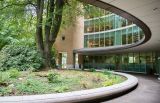A team of Harvard University scientists claimed that they are able to resurrect a revised version of the wooly mammoth in two years using the gene-editing technique CRISPR.
George Church, a geneticist and also the lead scientist of the team, explained at the American Association for the Advancement of Science (AAAS) in Boston that they resurrected mammoth will be a cross-breed between the mammoth and an Asian elephant.
He said that they are going to program mammoth traits to the Asian elephant with the use of the CRISPR technique. They are going to get the genes from the remains of a frozen mammoth.
Church added in an interview with The Guardian that the hybrid will be more of an elephant exhibiting some mammoth traits, such as smaller ears, hairy body, and subcutaneous fat. The mammophant, as it is often referred to, will also be highly adaptable to a cold climate.
The project started in 2015 and has undergone a number of "edits," where mammoth DNA has been spliced to the elephant genome 45 times already. Scientists said that they aim to establish embryogenesis in the lab as well as evaluating the impact of every edit to the cell.
The team said that their aim to resurrect the mammoth, albeit a hybrid, is also a way to help save the Asian elephant which is also nearing extinction. He said during the conference that aside from preserving the Asian elephant, the hybrid can help combat global warming.
He explained that the Asian elephants can help grass grow and knock down trees while the wooly mammoth can stop tundra permafrost by "punching through the snow" and letting cold air to enter.
However, not everybody in the science world agrees with the experiment. Matthew Cobb, a professor of zoology at the University of Manchester, said that both the mammoth and the Asian elephant are social animals and if a hybrid is introduced, he is worried how other elephant species will respond to them.
These ethical issues were also discussed during the meeting.
© 2025 University Herald, All rights reserved. Do not reproduce without permission.








